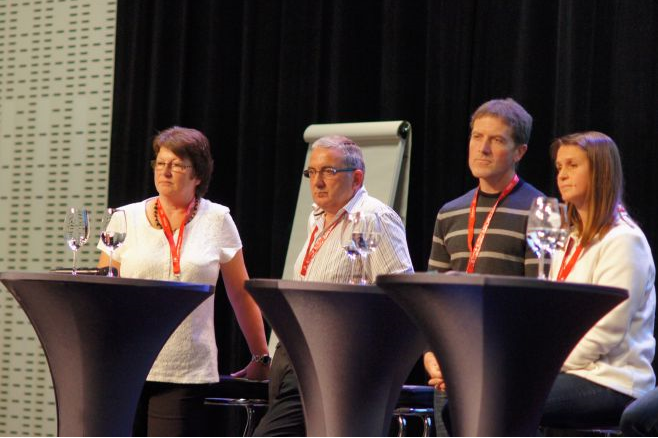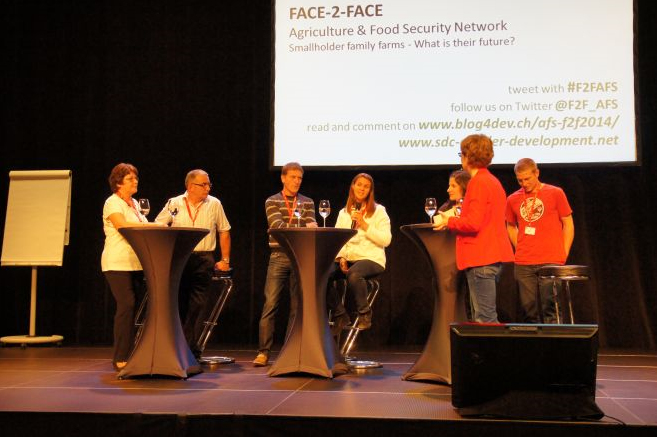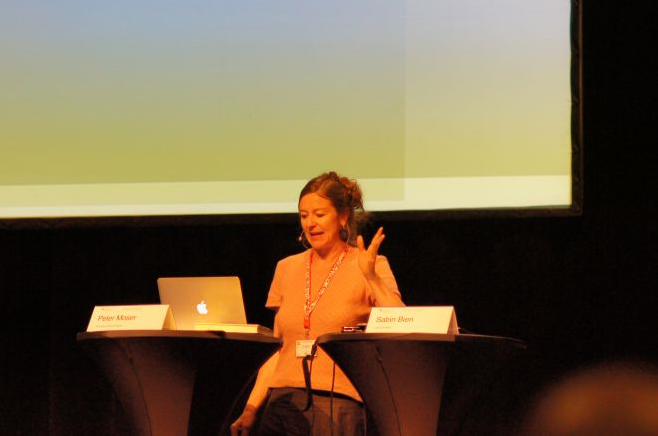The Swiss farmer’s union characterizes the female farmers as:
- Close to nature: aiming at bringing more enphasis on the ecological function of agriculture
- Entrepreneurial: focusing on market
- Rooted in their region: identification of Switzerland as agricultural society (even though the majority of people are not involved in agriculture)
There has been neither an explicit gender equality strategy in Swiss agricultural policy nor systematic gender mainstreaming. The federal equality policies did not explicitly address the agricultural sector either.
How do you see the future of your farms?
Panel with 3 farming couples
Erika and Martin: The farm increased in size over the last 25 years significantly and the work force reduced. In the future, they will turn into organic production in order to allow enough income again for a whole family. This means to follow the consumers demand and get reward also through consumer satisfaction rather than just subsidies.
Jodie and Peter: Today, there are less people working on the farm, mechanization has increased, more is produced with less labour forces. There is a need to reconsider the farm set up as a whole, possibly specialize on certain production, in order to gain time and increase life quality. Only like this it may be attractive for the children to take over.
Karin and Urs: They are very optimistic: people will always demand food. The strategy of the farm still has to be thought over and evaluated carefully, as they have ideas for changes (i.e. intensive cherry production) which require considerable investments for the next 20 years.

Two different professions on the farm in Switzerland?
Agriculturalist/farmer (Bauer/LandwirtIn): the person managing the farm (agricultural production)
Female farmer (Bäuerin): managing the household of family farms, involved in the farm production, as well as in the household. Female farmer is a different job than the agriculturalist/famer and there are two different training programmes. Female farmer’s training is quite popular nowadays (it regained popularity). Historically, female farmers managed the finance.
How are responsabilities shared on the farm?
Panel with 3 Swiss farmer couples
Martin and Erika: “You can only manage it as a good team. We divide tasks in a traditional way: Erika manages the household and children’s education and I run the agricultural production. My parents also worked on the farm and we have trainees”.
Urs und Karin: Urs is managing the farm and his parents still help, although they don’t always agree. Karin gives ideas and support, she is still studying and will have to decide on her role in the future.
Peter and Jodie: They share work and take decision together, often after intensive discussions and time to digest ideas and agree on solutions.
Erika and Jodie do not receive a salary, but have access to finances. Karin expects to receive a salary and Urs even proposed to make her managing part of the farm, as this would allow tax advantages.
Seed of Love - Why becoming a famer in Switzerland?
Panel with 3 Swiss farmer couples
Urs and Karin (young couple): they just took over the farm very recently, no children yet
Peter and Jodie (mid-age couple): they still have 15 years of activity ahead, 2 boys and 2 girls
Erika and Martin (older couple): they have been farming for a lifetime and are handing over to their son, 3 sons and 1 daughter

Urs, Peter and Jodie, Erika and Martin grew up on a farm. Karin didn’t but got trained as agriculturalist, attracted by the physical challenge of farming. Peter, Martin and Urs had the possibility to inherit the farm, and they were all motivated to follow the positive experience of their parents. Peter lives his dream: living with a beautiful woman and their children on his farm. Although Erika grew up on a farm, she never wanted to become a farmer, but she became a female farmer when she met her husband. Jodie grew up on an Australian farm, without formal training in farming. All three women started to farm out of love.
Fields of gender discrimination in Swiss agriculture
Sabine Bieri-Presentation.pdf

- Property (inheritance laws)
- Social security (In Switzerland social security is linked to employment status. Female farmers are usually not receiving a salary or having a status of employment)
- Formal education/training (there exist two type of formal education/training: agriculturalist/farmer and female farmer. Both education/trainings lead to different kind of jobs and -theoretically – are open to both gender. The female farmer training was created between the two World Wars to empower women…)
Property vs. Possession
Land possession is referred to the users’ rights. Land property includes the notion of collateral and serves as a security for credit credentials. In Switzerland there is no legal gender discrimination for property, but in practice the inheritance law favours the father-son inheritance. Farm land can only be inherited or sold to a person with a professional education in farming.
The history matters
PPP_Peter Moser.pdf
The historical perspective of Swiss agriculture development:
- Pre-industrial society: food security is a state affair
- 19th century: Food production is transformed from village affair to family business and the purchasing power becomes a decisive factor on the market
- World War I: vulnerability of highly specialized food production becomes evident. Food security is too important to let the market forces alone regulate it. Agriculture production and processing has to be organized as a ‘public service’
- 1950-70’: ‘green revolution’ to increase food production in western Europe
- 1990’: motivation for agricultural reforms are the ecological degradation (use of fossil resources) and the GATT/WTO trade agreements (demanding an open access to the food markets, favouring trading over production)
Family farm models today and tomorrow
Family farms have different legal status and land owning system, but they share the fact that the management and labour force is carried out by family members. This means that a lot of tasks are in the hand of women and children and elderly people. And this labour force is typically not paid. If we promote family farms, does it mean we promote more labour for women? If we foster more efficient farm models (high input, mechanization, etc.), does it mean we reduce job opportunities for young people in rural areas? However, it is assumed that family farms will stay at the centre of the food production system even in the future.
Welcome to day 3: joining networks, joining forces
The AFS network meets the Gender Equality network. Two networks moderated by two ‘Corinnes’. The VIP of the networks, namely Ursula Keller (head of Gender Equality network) and Felix Fellmann (head of AFS network) join hands. Participants from both networks representing all the continents attend Day 2.
Gender network and AFS network members exchange on the most memorable experience from Day 1.
Why putting the 2 networks together? While we ask the same question: how do agricultural policies impact lives of women and men in rural areas, and how do they influence our work?
